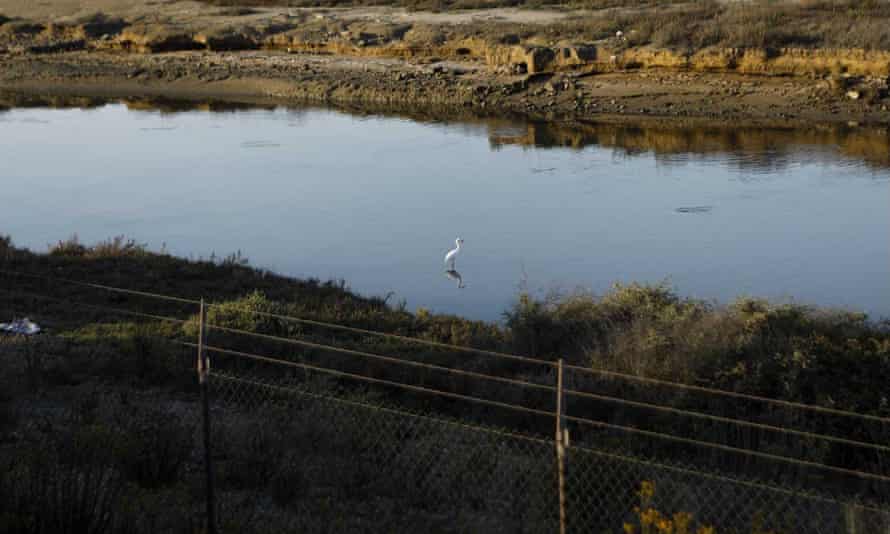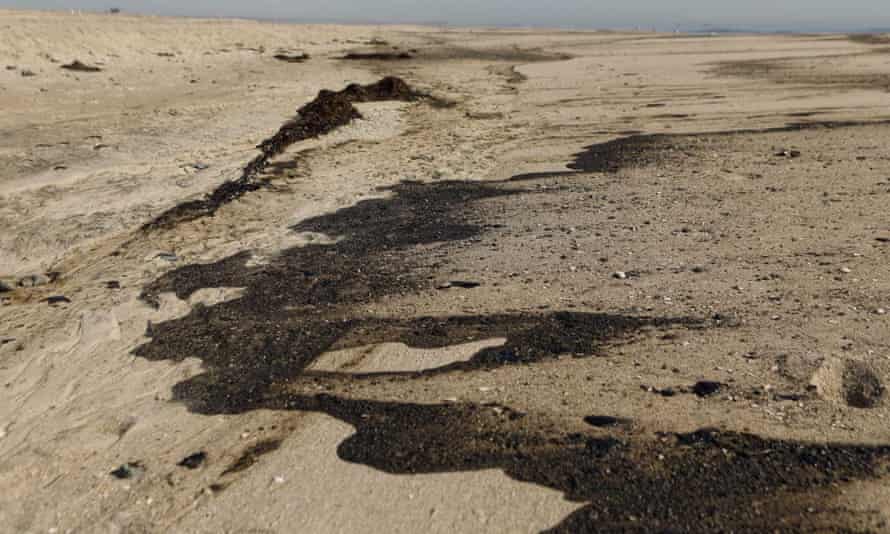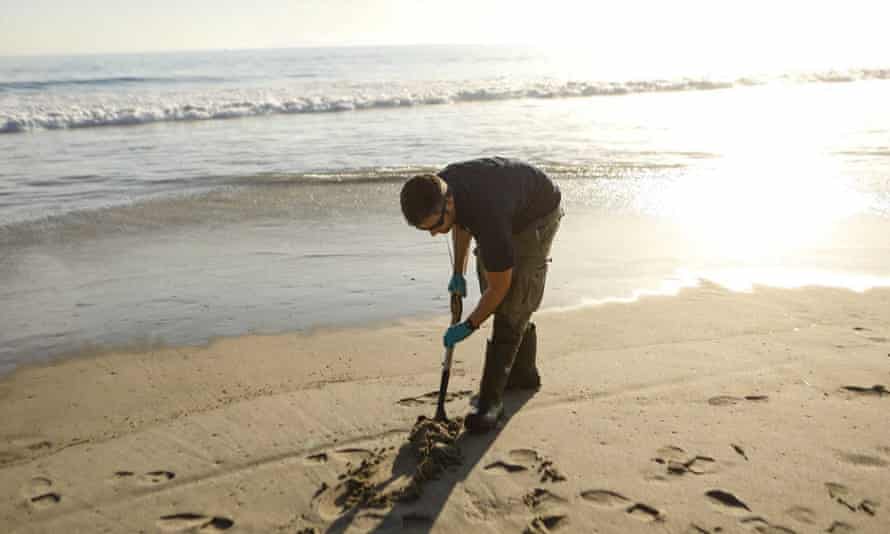California beaches closed as ‘devastating’ oil spill threatens wildlife

An estimated 126,000 gallons leaked from an underwater pipeline in one of the largest spills in recent state history
Temperatures in southern California surged on Sunday, but Huntington state beach was devoid of the umbrellas and beach blankets that would typically line its shore.
Instead, public works officials were working feverishly to stop the spread of an estimated 126,000 gallons of heavy crude oil that leaked from an underwater pipeline over the weekend in one of the largest spills in recent California history.
The spill is suspected to have originated in a 17.5-mile pipeline located 80-100ft beneath the surface off the Orange county coast. The pipeline connects to an oil production platform named Elly, which in turn is connected by a walkway to a drilling platform named Ellen. The platforms and another nearby platform are in federal waters and owned by the Houston-based company Amplify Energy Corp.
People who live and work in the area said they noticed an oil sheen and a heavy petroleum smell on Friday evening. The coast guard confirmed on Saturday afternoon that an oil slick had been spotted, and established a unified command. Amplify Energy Corp shut down operations of the pipeline and the platforms later that day. The company’s CEO, Martyn Willsher, said the pipeline was suctioned out so no more oil would spill.
By Sunday, booms were deployed on the water to try to contain the oil while divers sought to determine where exactly and why the leak occurred. Beaches were closed as teams raced to find animals harmed by the oil and to keep the spill from harming any more sensitive marshland.
But residents, business owners and environmentalists questioned whether authorities had reacted quickly. “By the time it comes to the beach, it’s done tremendous damage. Our frustration is, it could have been averted if there was a quick response,” said Garry Brown, president of the environmental group Orange County Coastkeeper.
The oil created a miles-wide sheen in the ocean and washed ashore in sticky, black globules. On Sunday afternoon, strong fumes from the oil still carried on the ocean breeze.
The oil will probably continue to wash up on the shore for several days and affect Newport Beach and other nearby communities, officials said.
Authorities are also looking into whether a ship’s anchor may have struck a pipeline on the ocean floor, causing the major leak of crude. The head of Amplify Energy said divers had examined more than 8,000ft (2,438 meters) of pipe and were focusing on “one area of significant interest”.
Coastguard officials said cargo ships entering the twin ports of Los Angeles and Long Beach routinely passed through the area.
“We’re looking into if it could have been an anchor from a ship, but that’s in the assessment phase right now,” said Lt Cmdr Jeannie Shaye.

Meanwhile, questions are mounting about Amplify Energy itself. The Associated Press reported on Monday that regulatory records show Amplify Energy has been cited 72 times for safety and environmental violations that were severe enough that drilling had to be curtailed or stopped to fix the problem.
In all, the Amplify subsidiary known as Beta Operating Co has been cited 125 times since 1980, according to a database from the Bureau of Safety and Environmental Enforcement, the federal agency that regulates the offshore oil and gas industry. The online database provides only the total number of violations, not the details for each incident.
The company was fined a total of $85,000 for three incidents. Two were from 2014, when a worker who was not wearing proper protective equipment was shocked with 98,000 volts of electricity, and, in a separate incident, crude oil was released through a boom where a safety device had been improperly bypassed.
Amplify operates three oil platforms about nine miles (14.5km) off the coast of California, all installed between 1980 and 1984. The company also operates a 16in pipeline that carries oil from a processing platform to an onshore storage facility in Long Beach. Before the spill, Amplify had high hopes for the Beta oil field and was pouring millions of dollars into upgrades and new “side track” projects that would tap into oil by drilling laterally.
The Huntington Beach mayor, Kim Carr, said the beaches of the community nicknamed “Surf City” could remain closed for weeks or even months.
“In a year that has been filled with incredibly challenging issues this oil spill constitutes one of the most devastating situations that our community has dealt with in decades,” Carr said. “We are doing everything in our power to protect the health and safety of our residents, our visitors and our natural habitats.”
The area affected by the latest spill is home to threatened and endangered species, including a plump shorebird called the snowy plover, the California least tern and humpback whales.
The effects of an oil spill are wide-ranging. Birds that get oil on their feathers can’t fly, can’t clean themselves and can’t monitor their own temperatures, said Miyoko Sakashita, director of the Center for Biological Diversity’s oceans program. Whales, dolphins and other sea creatures can have trouble breathing or die after swimming through oil or breathing in toxic fumes, she said.
There were reports that some birds and fish had been caught in the muck and died. The US coast guard said that by Saturday afternoon there had been just one ruddy duck covered in oil and receiving veterinary care. “Other reports of oiled wildlife are being investigated,” the agency said in a statement.

Huntington Beach resident David Rapchun said he was worried about the impact of the spill on the beaches where he grew up as well as the local economy.
“For the amount of oil these things produce I don’t think it’s worth the risk,” Rapchun said. He questioned whether drilling for oil was a wise idea along some of southern California’s most scenic beaches. “We need oil, but there’s always a question: do we need it there?” he said.
The spill comes three decades after a major oil leak hit the same stretch of Orange county coast. On 7 February 1990, an oil tanker ran over its anchor off Huntington Beach, spilling nearly 417,000 gallons (1.6m liters) of crude. Fish and about 3,400 birds were killed.
In 2015, a ruptured pipeline north of Santa Barbara sent 143,000 gallons (541,313 liters) of crude oil gushing onto Refugio state beach.

At Huntington Beach on Sunday, Daniel Orr and Peter Boucher, two senior environmental scientists with the California department of fish and wildlife, rushed to collect samples from an area spotted with globs of black. The scientists sampled sand and water, and unearthed sand crabs still scuttling underneath the lapping tide.
“Our role is to study the spill and its impacts,” Orr said, adding that it was still too early to know how much of an ecological toll the spill will take.